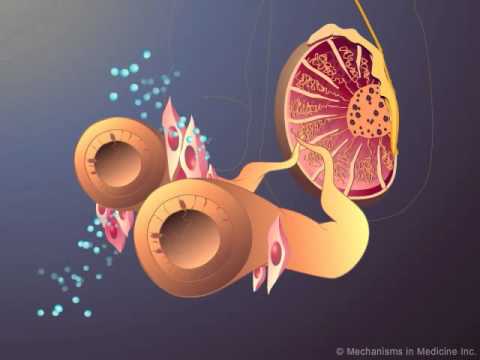Coping with Premature Ejaculation: Tips for Men and Their Partners

Understanding Premature Ejaculation: Causes and Myths
Premature ejaculation is a common sexual problem experienced by many men, but its causes are often misunderstood. Contrary to popular belief, premature ejaculation is not solely caused by psychological factors such as anxiety or performance pressure. In fact, it can be influenced by a combination of physical and psychological factors.
One of the main physical causes of premature ejaculation is hypersensitivity of the penis. This means that the penis may be overly sensitive to touch, leading to a quick release of semen. Another physical cause is an imbalance in certain brain chemicals, particularly serotonin. Serotonin is responsible for regulating mood and emotions, and low levels of this neurotransmitter can contribute to premature ejaculation.
On the other hand, psychological causes can include anxiety, stress, and relationship problems. These factors can create a negative cycle where the fear of ejaculating prematurely leads to heightened anxiety, which in turn increases the likelihood of premature ejaculation. It’s important to note that premature ejaculation is not a reflection of a man’s masculinity or sexual ability, but rather a treatable medical condition. Understanding the causes of premature ejaculation is the first step towards finding effective treatment options and improving sexual well-being.
The Impact of Premature Ejaculation on Men’s Mental Health

Premature ejaculation is a common sexual dysfunction that can have a significant impact on men’s mental health. The experience of ejaculating earlier than desired during sexual activity can lead to feelings of embarrassment, shame, and frustration. These negative emotions can quickly take a toll on a man’s self-esteem and confidence, affecting various aspects of his life.
Research has shown that men who struggle with premature ejaculation often experience heightened levels of anxiety, depression, and stress. They may develop a fear of intimacy and avoid sexual encounters altogether to avoid the potential embarrassment of premature ejaculation. This avoidance behavior can strain relationships and lead to feelings of isolation and loneliness.
Moreover, the psychological impact of premature ejaculation can extend beyond the bedroom. Men may find themselves constantly worrying about their performance during sexual activities, which can lead to a decrease in overall enjoyment and satisfaction. The fear of disappointing their partner can also create a significant amount of pressure and stress, further exacerbating the problem.
It is crucial to recognize that premature ejaculation is not a reflection of a man’s sexual prowess or masculinity. It is a treatable condition that can be effectively managed with the right approach. By addressing the mental health implications and seeking appropriate treatment, men can regain their confidence and enjoy a fulfilling sexual life.
Communicating Openly: Discussing Premature Ejaculation with Your Partner
Premature ejaculation can be a difficult topic to broach, but open communication with your partner is key to understanding and addressing the issue. By discussing premature ejaculation in a supportive and non-judgmental manner, you can reduce stress and anxiety, and find solutions together.
Start by choosing a comfortable setting and time for the conversation. It’s important to create an environment where both you and your partner feel safe to express your concerns. Remember that premature ejaculation is a common issue that affects many couples, so approaching the topic with empathy and understanding is essential. Refer to reputable sources and scientific facts to reinforce the normalcy of this condition. Openly communicate your own feelings and emotions, and encourage your partner to share their thoughts as well. This exchange can help foster trust and create a space for finding solutions together.
Exploring Different Treatments for Premature Ejaculation
Premature ejaculation is a common condition that can greatly impact a man’s sexual health and overall well-being. Fortunately, there are various treatment options available to help manage and overcome this issue. Let’s explore some of the different treatments that individuals can consider.
One approach to addressing premature ejaculation is through behavioral techniques. This involves learning and practicing specific techniques that can help delay ejaculation and improve sexual satisfaction. These techniques may include the stop-start method, where sexual activity is paused before ejaculation occurs, or the squeeze technique, which involves applying pressure to the base of the penis. By incorporating these techniques into their sexual routine, individuals can gradually gain better control over their ejaculation response.
In addition to behavioral techniques, certain medications may also be prescribed to help manage premature ejaculation. Selective serotonin reuptake inhibitors (SSRIs), typically used as antidepressants, have been found to be effective in delaying ejaculation. These medications work by increasing the serotonin levels in the brain, which can delay the ejaculatory reflex. However, it is important to note that SSRIs may have certain side effects, such as nausea and decreased libido, and should be taken under the guidance of a healthcare professional.
The Role of Lifestyle Changes in Managing Premature Ejaculation

Making certain lifestyle changes can play a significant role in managing premature ejaculation. One potential contributing factor to this condition is stress. High levels of stress can lead to sexual performance anxiety, which may exacerbate the problem. Therefore, finding effective stress management techniques, such as regular exercise, deep breathing exercises, and meditation, can be helpful in reducing anxiety and promoting relaxation.
Additionally, adopting a healthy lifestyle can positively impact sexual function. Maintaining a balanced diet, rich in fruits, vegetables, and whole grains, can support overall well-being and sexual health. It is also important to limit alcohol consumption and avoid smoking, as both can have negative effects on sexual performance. Regular exercise not only helps to reduce stress but also improves cardiovascular health, enhancing blood circulation to the genital area, which may have a positive influence on ejaculatory control. By making these positive lifestyle changes, individuals may find improvements in their ability to manage premature ejaculation.
Enhancing Sexual Pleasure: Techniques for Prolonging Ejaculation
When it comes to enhancing sexual pleasure, many individuals seek techniques for prolonging ejaculation. Whether it’s to increase the duration of intimacy or to satisfy their partner’s needs, these techniques can be beneficial in creating a more fulfilling sexual experience. One technique that individuals can explore is the “stop-start” method. This involves engaging in sexual activity until reaching the point of near ejaculation, then stopping stimulation altogether for a brief period before starting again. By repeating this process multiple times during sexual activity, individuals can learn to prolong their ejaculation and, in turn, prolong their pleasure.
In addition to the stop-start method, another technique individuals can try is known as the “squeeze” technique. This involves applying pressure to the base of the penis, just below the head, when nearing ejaculation. By gently squeezing this area for a few seconds, individuals can temporarily halt the ejaculation process. This technique can help individuals gain control over their ejaculation and prolong the overall sexual experience. Understanding and practicing these techniques can contribute to a more satisfying sexual relationship for both partners involved. However, it’s important to note that these techniques may not work for everyone, and individuals may benefit from exploring other methods or seeking professional help if they continue to experience difficulties.
The Importance of Foreplay and Building Sexual Stamina

Foreplay is an essential component of sexual intimacy and can significantly contribute to a pleasurable and satisfying sexual experience for both partners. It involves a range of physical and psychological activities that build arousal, enhance communication, and establish a connection between partners. Engaging in foreplay can lengthen the duration of sexual activity, allowing individuals to better manage premature ejaculation and experience more fulfilling sexual encounters.
One of the primary benefits of foreplay is that it helps individuals build sexual stamina. By engaging in prolonged foreplay, individuals can gradually increase their tolerance to sexual stimulation and prolong the time it takes to ejaculate. This can be particularly helpful for those who struggle with premature ejaculation, as it allows them to delay ejaculation and prolong sexual activity. Additionally, foreplay provides an opportunity for partners to explore each other’s bodies, learn about their desires and preferences, and build a deeper sense of intimacy and connection.
Overall, incorporating ample foreplay into one’s sexual routine can have numerous benefits, from enhancing sexual pleasure to managing premature ejaculation. By taking the time to explore each other’s bodies, communicate openly, and build stamina, couples can foster a more fulfilling and intimate sexual relationship. However, it is important to recognize that everyone’s preferences and needs may differ, and communication is key to finding what works best for each individual and their partner.
Managing Stress and Anxiety: How It Affects Premature Ejaculation
Stress and anxiety are common experiences that can have a significant impact on our overall well-being. When it comes to premature ejaculation, these psychological factors can play a crucial role in occurrence and severity. The link between stress, anxiety, and premature ejaculation is well-established, and understanding this connection can be a crucial step in finding effective management strategies.
Research has shown that increased stress levels can lead to a heightened state of arousal, making it more difficult to control ejaculation. In fact, studies have found that individuals experiencing chronic stress or anxiety are more likely to experience premature ejaculation. Constant worry, pressure, and tension can result in a negative cycle of performance anxiety, further exacerbating the issue.
Furthermore, stress and anxiety can indirectly contribute to premature ejaculation by affecting a person’s overall sexual satisfaction and self-esteem. Persistent stress can interfere with intimacy, communication, and emotional connection with a partner, creating additional pressure and anxiety during sexual encounters. All of these factors combined can significantly impact a man’s mental health and well-being, leading to feelings of frustration, embarrassment, and even depression.
It is important to recognize that stress and anxiety are natural responses to various life situations, and they can be managed effectively with the right approach. In the upcoming sections, we will explore different strategies that can help individuals cope with stress and anxiety, ultimately improving their control over ejaculation. By addressing the underlying psychological factors, individuals affected by premature ejaculation can take proactive steps towards enhancing their sexual experiences and overall quality of life.
Seeking Professional Help: When to Consult a Doctor or Therapist
Premature ejaculation can be a distressing condition that affects many men. While occasional instances of premature ejaculation are common and generally not a cause for concern, persistent issues may warrant seeking professional help. Consulting a doctor or therapist can provide valuable guidance and support in managing this condition.
If you are experiencing frequent episodes of premature ejaculation and it is causing distress or affecting your quality of life, it may be time to consult a healthcare professional. A doctor or therapist can help determine the underlying causes and develop an appropriate treatment plan tailored to your specific needs. They will typically inquire about your medical history, sexual history, and relationship dynamics to gain a comprehensive understanding of the situation.
Seeking professional help is particularly important if your premature ejaculation is accompanied by other symptoms such as erectile dysfunction, low libido, or relationship problems. These issues can be interconnected, and a healthcare professional can help address the underlying causes holistically. Additionally, if you have tried self-help techniques or over-the-counter treatments without success, a doctor or therapist can provide more effective solutions to manage and overcome premature ejaculation.
It’s essential to remember that healthcare professionals are trained and experienced in addressing sexual health concerns, including premature ejaculation. They can offer a range of evidence-based therapies and interventions, such as counseling, behavioral techniques, medications, or a combination of approaches, depending on your specific needs. By taking the step to consult a doctor or therapist, you are proactively prioritizing your sexual health and well-being.
Coping Strategies for Partners: Supporting Each Other through Premature Ejaculation
Supporting each other through the challenges of premature ejaculation can be a crucial aspect of maintaining a healthy and fulfilling relationship. It is important for both partners to approach the issue with empathy, understanding, and open communication. By working together, couples can find coping strategies that not only help manage the physical aspects of premature ejaculation but also strengthen their emotional connection.
One effective coping strategy is to focus on expanding sexual repertoire beyond intercourse. Engaging in extended foreplay, exploring different forms of stimulation, and incorporating intimate activities that do not solely rely on penetration can help alleviate performance pressure and create a more relaxed and enjoyable sexual experience for both partners. This approach allows couples to focus on pleasure and intimacy rather than solely on the duration of intercourse, relieving anxiety and fostering a deeper emotional connection. Additionally, experimenting with different positions and techniques that enable the man to maintain control can be beneficial for prolonging sexual encounters and reducing the pressure to reach orgasm quickly.
Emotional Intimacy and Connection: Strengthening Relationships during Difficulties
Emotional intimacy and connection are crucial aspects of any relationship, but they become even more vital during times of difficulties, such as facing challenges related to premature ejaculation. Building and strengthening emotional bonds can provide a foundation of support and understanding for both partners.
During difficult times, it is important to create a safe space where open and honest communication can thrive. This allows both partners to express their emotions, concerns, and needs without fear of judgment or rejection. By actively listening and empathizing with each other, couples can foster a deeper understanding and develop strategies to navigate through the challenges of premature ejaculation.
Research indicates that couples who prioritize emotional intimacy have a stronger sense of unity and satisfaction in their relationships, even when dealing with sexual difficulties. In fact, studies have found that emotional closeness can act as a protective factor against relationship distress caused by sexual concerns. By nurturing emotional bonds, couples can create a supportive environment where they can openly discuss their experiences with premature ejaculation and work together towards finding solutions that meet both partners’ needs.
Creating emotional intimacy and connection is an ongoing process that requires effort and understanding from both partners. It involves deepening emotional awareness, practicing empathy, and actively working on maintaining a strong emotional bond. As couples navigate the challenges of premature ejaculation, investing in their emotional connection can help them stay connected, maintain trust, and strengthen their overall relationship.
Overcoming Performance Anxiety: Tips for Boosting Confidence
Performance anxiety can be a distressing experience for many men, leading to a lack of confidence and self-esteem in the bedroom. However, it’s important to remember that you are not alone in facing these challenges. Performance anxiety is a common issue that can affect men of all ages and backgrounds.
One key tip for overcoming performance anxiety and boosting confidence is to focus on pleasure rather than pressure. Instead of fixating on achieving a specific goal or performance, try shifting your mindset to prioritize enjoying the experience and connecting with your partner. Remember, intimacy is about more than just sexual performance. Building emotional connection and exploring each other’s desires and needs can greatly enhance the sexual experience for both partners.
Another helpful strategy is to communicate openly with your partner. Share your concerns, fears, and desires with them. Often, simply talking about your anxieties and seeking reassurance can alleviate some of the pressure you are feeling. Your partner may also be able to offer support and understanding, which can further strengthen your bond and increase your confidence.
Remember, overcoming performance anxiety takes time and practice. Be patient with yourself and your partner as you work through these challenges. With open communication, a focus on pleasure, and a willingness to explore and learn together, you can build confidence and enjoy a fulfilling and satisfying sexual relationship.
The Influence of Pornography and Expectations on Premature Ejaculation
The influence of pornography and expectations on premature ejaculation is a complex topic that requires careful examination. While some individuals may argue that pornography can contribute to premature ejaculation, others may believe that it has no effect. Research suggests that exposure to pornography can indeed impact sexual performance and expectations.
One study published in the Journal of Sexual Medicine found that frequent pornography viewing was associated with higher levels of sexual dissatisfaction and difficulty controlling ejaculation. The unrealistic portrayals of sexual encounters in pornography can create unrealistic expectations for sexual performance, leading to anxiety and pressure to measure up to the exaggerated standards depicted. This can contribute to premature ejaculation as individuals strive to meet these unrealistic ideals.
Moreover, the constant exposure to highly arousing visual stimulation in pornography can desensitize the brain’s reward circuitry, making it more difficult to achieve arousal and satisfaction during real-life sexual encounters. This desensitization can lead to difficulties with ejaculation timing, including premature ejaculation.
It is essential to recognize that pornography is not the sole factor contributing to premature ejaculation. There are various other causes, including psychological factors, relationship issues, biological factors, and even medical conditions. It is crucial to approach this topic with sensitivity, understanding that every individual’s experience is unique and multifaceted. Discussing these matters openly and seeking professional guidance can help individuals address and manage premature ejaculation effectively.
Alternative Therapies and Natural Remedies for Premature Ejaculation
Alternative Therapies and Natural Remedies for Premature Ejaculation offer individuals an option to manage and improve their sexual experiences. While medical interventions such as medications and therapy are widely used to address this issue, some people prefer to explore alternative treatments that are more natural and holistic. It is important to note that these alternative therapies and remedies may vary in their effectiveness from person to person, and it is essential to consult with a healthcare professional before trying any new approach.
One alternative therapy that has gained popularity in recent years is acupuncture. Acupuncture involves the insertion of thin needles into specific points on the body to stimulate energy flow and restore balance. Some studies suggest that acupuncture may help improve premature ejaculation symptoms by reducing anxiety and enhancing overall sexual function. However, further research is needed to fully understand its effectiveness and mechanisms of action.
Another natural remedy that individuals may consider is the use of herbal supplements. Several herbs, such as Tribulus terrestris, Withania somnifera, and Panax ginseng, have been traditionally used for sexual health and performance. These herbs are believed to have aphrodisiac properties and may help improve sexual stamina and control. However, it is crucial to be cautious when using herbal supplements as they may interact with other medications and cause unwanted side effects. Consulting with a healthcare professional and choosing reputable brands is recommended to ensure safety and efficacy.
Considering alternative therapies and natural remedies for premature ejaculation may be appealing to individuals seeking a more holistic approach. However, it is crucial to keep in mind that these options may not work for everyone, and evidence supporting their effectiveness is still limited. Therefore, it is advisable to discuss these treatments with a healthcare professional who can provide guidance and personalized recommendations based on individual circumstances.
Healthy Relationships: Nurturing Intimacy Beyond Sexual Performance
In a healthy relationship, intimacy goes far beyond sexual performance. While physical intimacy is an important aspect, emotional connection and open communication also play vital roles in fostering a deep and fulfilling bond between partners.
Establishing trust and emotional intimacy requires effort from both individuals. This can be achieved through regular and honest conversations. Sharing personal thoughts, dreams, and fears can help create a safe and supportive environment where both partners can feel comfortable expressing their desires and needs.
Moreover, healthy relationships involve mutual respect and understanding. Each person should feel valued and appreciated for who they are, both inside and outside the bedroom. Taking the time to learn about each other’s love languages, preferences, and boundaries can lead to a stronger emotional connection.
Cultivating a sense of adventure and excitement in a relationship can also contribute to nurturing intimacy. Engaging in activities together, exploring new hobbies, or embarking on new experiences can create lasting memories and strengthen the bond between partners.
Overall, nurturing intimacy beyond sexual performance is about investing time and effort into building a strong emotional connection and open communication. By prioritizing emotional intimacy, couples can create a foundation of trust, respect, and understanding that enhances all aspects of their relationship.
Note: The paragraphs provided mainly focus on the importance of building emotional intimacy and open communication in a healthy relationship. It is important to note that this advice is general and may not address specific individual circumstances. For personalized guidance, it is recommended to seek the assistance of a therapist or relationship counselor.
What are the common causes of premature ejaculation?
Premature ejaculation can be caused by various factors, including psychological issues, stress, anxiety, relationship problems, hormonal imbalances, and certain medical conditions.
How does premature ejaculation affect a man’s mental health?
Premature ejaculation can have a significant impact on a man’s mental health, leading to feelings of frustration, embarrassment, low self-esteem, and even anxiety or depression.
What is the best way to discuss premature ejaculation with my partner?
It is important to approach the topic of premature ejaculation with your partner in an open and honest manner. Choose a calm and non-judgmental environment to have a conversation, expressing your concerns and desires while actively listening to your partner’s thoughts and feelings.
Are there different treatment options available for premature ejaculation?
Yes, there are various treatment options for premature ejaculation, including behavioral techniques, medication, counseling, and therapy. It is recommended to consult a healthcare professional to determine the most suitable treatment approach for your specific situation.
Can lifestyle changes help in managing premature ejaculation?
Yes, certain lifestyle changes can contribute to managing premature ejaculation. These may include regular exercise, a healthy diet, stress reduction techniques, and avoiding excessive alcohol or drug use.
What are some techniques for prolonging ejaculation and enhancing sexual pleasure?
Some techniques for prolonging ejaculation and enhancing sexual pleasure include practicing the stop-start method, using the squeeze technique, trying different sexual positions, and using desensitizing sprays or condoms.
How does stress and anxiety affect premature ejaculation?
Stress and anxiety can significantly contribute to premature ejaculation by increasing arousal levels and interfering with the ability to relax during sexual activities. Managing stress and anxiety through relaxation techniques and seeking support can help alleviate these issues.
When should I consider consulting a doctor or therapist for premature ejaculation?
If premature ejaculation persists and significantly affects your quality of life or your relationship, it is advisable to consult a healthcare professional or therapist. They can provide guidance, assess underlying causes, and recommend appropriate treatment options.
How can partners support each other through the challenges of premature ejaculation?
Partners can support each other through premature ejaculation by maintaining open communication, reassurance, and understanding. Exploring different techniques together, seeking professional help, and focusing on emotional intimacy can also strengthen the relationship.
How can we nurture intimacy beyond sexual performance in a healthy relationship?
Nurturing intimacy beyond sexual performance involves focusing on emotional connection, spending quality time together, engaging in non-sexual activities that foster closeness, and prioritizing open communication and mutual support.






